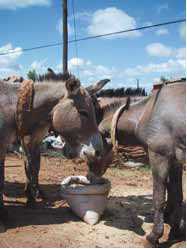Protein Requirements - Donkey

Proteins are required by all living creatures for growth and repair of body tissues. They are polypeptide chains consisting of individual amino acids linked together. The properties of individual proteins are determined from the combination and number of different amino acids comprising the polypeptide chain.
Ten amino acids cannot be synthesised to any great degree by the body and must be supplied in food; these are referred to as the essential amino acids (EAA). Proteins that contain a relatively high proportion of EAA are called high-quality proteins; low-quality proteins contain only small amounts of EAA. The requirement for certain EAA (lysine, cysteine and methionine) is much greater than others, and if the requirement for any one of these is not met in the diet, the ability of the animal to grow, recover from injury, lactate or reproduce will be severely limited, even if the other EAA are fed to excess.
In ruminants, another source of EAA is derived from the digestion of microbial protein that is produced as a by-product of fibre digestion. A similar process occurs in donkeys, although the microbial-derived EAA cannot be digested or absorbed before they are excreted in the faeces. However, the ability of donkeys to thrive and grow on the very low protein forages found in many tropical countries does provide some anecdotal evidence that processes of protein digestion and metabolism in donkeys are more complex than is currently perceived.
As a general rule, once the energy requirements of an animal are satisfied by the diet, then the protein requirements tend also to be satisfied. This has been confirmed by recent studies at the Donkey Sanctuary which measured the digestible crude protein (DCP) requirements for adult donkeys at 26 ± 1.3 g DCP per 100 kg bodyweight per day (Wood et al, 2005). In practice, for healthy, mature animals this amount of DCP would be comfortably supplied from the diet based on hay and ad libitum straw that was suggested in the energy requirement section. However, growing, breeding, ill or elderly donkeys will have a higher protein requirement that may not be met by a simple straw and hay diet. A multi-supplement containing EAAs should be provided.
References
- Smith, D. and Wood, S. (2008) Donkey nutrition In Svendsen, E.D., Duncan, J. and Hadrill, D. (2008) The Professional Handbook of the Donkey, 4th edition, Whittet Books, Chapter 1
- Wood, S.J., Smith, D.G., and Morris, C.J. (2005). ‘Seasonal variation of digestible energy requirements of mature donkeys in the UK’. Proceedings Equine Nutrition Conference, Hanover, Germany. 1-2 October 2005. pp 39-40.
|
|
This section was sponsored and content provided by THE DONKEY SANCTUARY |
|---|